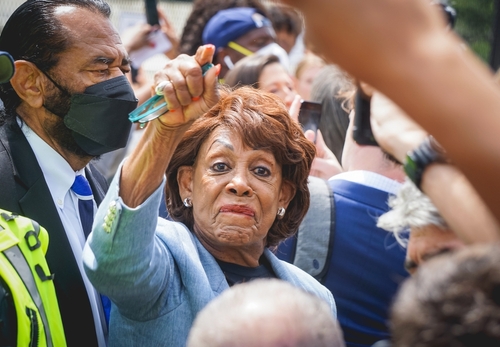
In a striking display of political irony, Democratic Representative Maxine Waters, known for her vociferous stance against Trump administration officials, found herself at the receiving end of public confrontation. This incident has sparked a broader conversation about the nature of political discourse in America, particularly among conservatives who view Waters' reaction as emblematic of a deeper issue within the Democratic Party's approach to civility and disagreement.
Waters, who once encouraged her supporters to publicly confront members of Trump's Cabinet, seemed to change her tune when faced with opposition. During an encounter in a restaurant, she was challenged over her political positions, leading her to decry the confrontation as motivated by racism, despite acknowledging that no explicitly racist remarks were made. This claim has raised eyebrows, especially considering her previous encouragement of similar tactics against political adversaries.
Congresswoman Maxine Waters says she is a victim of racist attacks:
"They don't say racist things, but they do say that they don't like something I said." pic.twitter.com/2fZDenWbuO
— End Wokeness (@EndWokeness) April 10, 2024
The episode underscores a perceived double standard in Waters' stance on public political engagement. Her discomfort with receiving the same kind of treatment she advocated for reveals an inconsistency in handling political discord. It prompts a reflection on the importance of maintaining civility in political discourse and the potential repercussions of encouraging confrontations.
Critics argue that Waters' reaction to the restaurant confrontation highlights a broader issue within certain political circles—a tendency to quickly play the race card in situations where political views are challenged, without substantial evidence of racial animus. This approach not only dilutes the serious charge of racism but also diverts attention from the substantive political disagreements at hand.
Rep. Maxine Waters just said she’s a victim of racism because she gets criticized.
She admits she doesn’t get called anything racist but that her being criticized at all is proof of racism.
You can’t reason with people like Waters who are this insane.pic.twitter.com/bTUi3Z1qN5
— Paul A. Szypula 🇺🇸 (@Bubblebathgirl) April 10, 2024
Moreover, Waters' experience serves as a cautionary tale about the dangers of inciting public harassment. The backlash she received demonstrates the volatility of encouraging such actions, which can easily spiral out of control and lead to unintended consequences. It raises questions about the responsibility of public figures to foster a political environment where differences are settled through dialogue rather than confrontation.
The incident with Waters also provides insight into the broader dialogue on civility in political discourse. It highlights the need for leaders on both sides of the aisle to model respectful engagement, even in the face of profound disagreement.
Encouraging or condoning harassment against political opponents not only undermines the democratic process but also contributes to the increasing polarization of American society.
In conclusion, the confrontation faced by Maxine Waters in a restaurant, and her subsequent reaction, offers a moment for reflection on the state of political civility in America. It serves as a reminder of the importance of maintaining respect and decorum in public discourse, regardless of one's political affiliations. As the nation grapples with deep divisions, the path forward requires a commitment to dialogue and understanding, rather than confrontation and vilification.
We want to hear from you! Please share your perspective by commenting below.












The cry of “racism” is dead, as a deterrent; it’s been so overused and abused for so long, it’s meaningless! This woman is 1 of the primary reasons for that! If she truly WANTS civility in the discourse, she should try leading by example! Civility has not been an hallmark of her rhetoric in decades!
It is soooooo true that black people always want to pull the race wagon!!! Beware of what you say if you are a politician as it may come back to haunt you!!!!!
Your posts are like a collection of happy snapshots. Thank you for capturing the joyful moments!